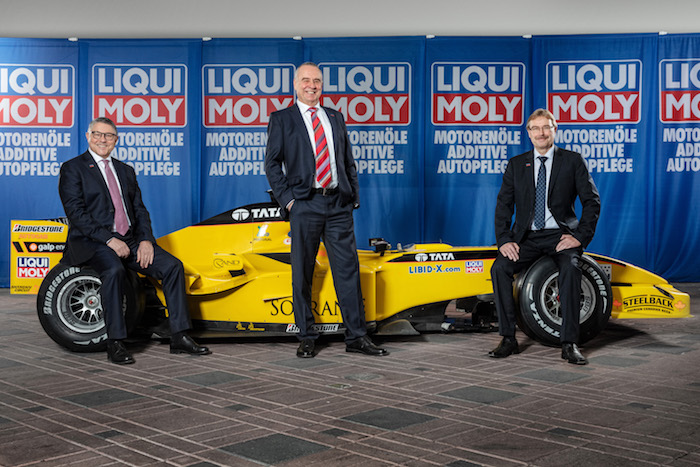Liqui Moly enters Formula 1
Posted by
The German oil and additive specialist, Liqui Moly, opens the 2019 financial year by announcing it is going into Formula 1. It will be advertising on the race track at eleven races. “We hope that out of the more than 1 billion viewers who follow this spectacle on television all over the world every year, it may occur to some of them to take a closer look at Liqui Moly and purchase our products,” explains CEO Ernst Prost.
Liqui Moly will be showcased on a large scale for the first time at the Bahrain Grand Prix on March 31. “Formula 1 and Liquid Moly are a great match – after all, both stand for absolute top-class performance”, says Ernst Prost.
After the Bahrain Grand Prix, the Liquid Moly logo will be on show at half of the remaining races. The campaign will cost the company several millions. “If you want to reach that many people all over the world, you can’t be a penny pincher: you have to think globally and make huge investments,” says Ernst Prost. Formula 1 is not new to the lubricant brand. Liqui Moly was involved with Team Jordan in the 2000s.
“The aim of advertising in Formula 1 is to raise our brand profile. Oils and additives do their job invisibly, hidden in the depths of the engine. They’re not products that drivers see and get thrilled about on a day-to-day basis. This is why brand visibility is all the more important for Liqui Moly. Top-class quality alone is not much help if nobody knows about the benefits,” explains Ernst Prost.
In addition to Formula 1, Liqui Moly’s international activities include the motorcycle world championship MotoGP and the touring car championship TCR. In addition, the company has a whole range of involvements at national, regional and local levels. “We go out to where the customers are and where they live – and that’s in their home country,” says Günter Hiermaier, sales director and second CEO of Liqui Moly.
Liqui Moly’s blue, red and white logo has been in situ at the world handball championships, which broke all records, at the ice hockey world championships, at the Four Hills Tournament, at the world ski championships and with the Chicago Bulls in the NBA. “This taps into new target groups and customers for us, as well as bridging over the winter break in motor racing. Three factors are always crucial: the number of spectators on site, the media presence and the potential for creating positive associations with our own brand image,” explains marketing director Peter Baumann.
“Formula 1, MotoGP, world handball championships, ice hockey world championships – the potential in all of those is simply enormous”, says Ernst Prost. “It just shows the level we’re now operating at. You can hardly get any better than this. As a sponsor, we only purchase excellent sports events with outstanding TV coverage – mainly events with an international and indeed global impact.”
In addition to its sponsorship, Liqui Moly, also stimulates business by means of classic advertising. In autumn 2018 the company kicked off its first worldwide digital campaign, which generated 1.6 billion contacts. “We’re sensing that the pressure to advertise has increased in recent years,” says Ernst Prost. “We have to promote ourselves even more to even get noticed – which means investing more money on raising our brand profile.”
Liqui Moly set a new sales record in 2018 once again But success is a question of perspective, too. Two per cent sales growth is not that much of an achievement for a company that is so used to performing well. This is why Ernst Prost is now going on the offensive: “We’re really going to make splash in 2019. Part of this will be our appearance in Formula 1.”
Here Liqui Moly is increasingly deploying a new sales strategy. Traditionally the company has sold its products through independent importers in most countries. In Italy and France, the company will now be taking care of its own sales. “Not every importer has the resources required to develop sales the way we would like to,” says Ernst Prost. “Our potential is on a totally different scale when it comes to growing – not just in small steps but in huge jumps.” This does of course mean initially spending money on staff and advertising. “But these investments pay off in the long run – both Italy and France hold enormous potential for us.”
Success is to be based on three pillars this year. Ernst Prost: “Excellent product quality, world-class sales power and a drastic raising of our brand profile.”








